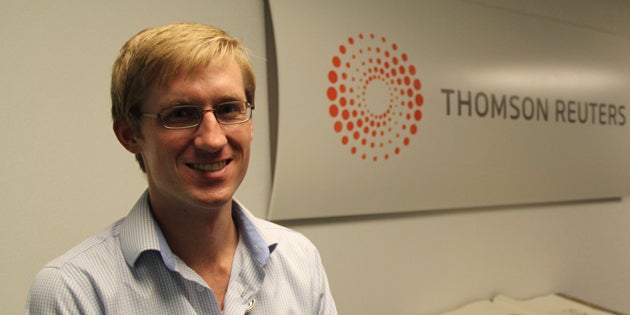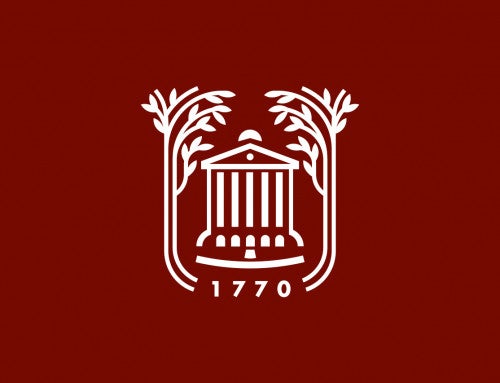College of Charleston alumnus Nathan Frandino ’10 knows better than most Americans what it feels like to be caught up in pandemonium and unbridled emotion that surrounds soccer in and around the Brazilian host cities of the World Cup.
Frandino is a producer for Reuters TV in Washington D.C. He just returned from Brazil where he was part of a team covering the World Cup. In fact, he was just a short distance from Mineirao Stadium in the city of Belo Horizonte when Brazil beat Chile on June 28, 2014. It’s the same city where Brazil will play Germany in a semifinal match on Tuesday.
A graduate of Mount Pleasant’s Wando High School and a communication and Spanish major at the College, Frandino says his studies and his fluency in Spanish helped prepare him for a career in journalism – and the assignment of lifetime.
Q: How did you get assigned to cover the World Cup?
A: I landed this assignment due to my language skills and my ability to shoot video. I started learning Spanish early on in high school and in college and started learning Portuguese this year, leading up to the trip. I learned how to shoot video at the City University of New York Graduate School of Journalism and from our Reuters TV cameraman here in D.C. Although I ended up working with a cameraman in Brazil, it’s always good to have a repertoire of skills that can be used if and when you do work alone.
RELATED: Watch a video that Frandino produced about World Cup fans flocking to Brazil’s famous Pantanal wetlands.
Q: Which cities did you visit and what kind of stories did you produce?
A: I visited Cuiabá in the Mato Grosso state and Belo Horizonte in the Minas Gerais state. In both cities, I covered team trainings and team news conferences on the days prior to the matches. On match day, I covered fan arrivals in the city for the match as well as fan reactions after the matches. In between those days, our team would explore the cities and look for good feature stories. In Mato Grosso, our team traveled to the Chapada Dos Guimaraes National Park and to the Pantanal wetlands — both of which were major nature, ecotourism destinations that Brazilian officials were hoping to showcase in that region. Cuiabá was chosen as a host-city for its nature offerings and they did not disappoint. We saw beautiful landscapes of greenery along with alligators, monkeys and more. Pantanal is the world’s biggest wetlands. We also covered an infrastructure story in Cuiabá, where the light rail system was supposed to be finished in time for the World Cup but was nowhere near completed.
Q: Were you part of a news team?

Producer Nathan Frandino (left), Entertainment and Lifestyle Editor Mary Milliken and cameraman Sasa Kavic on assignment at the Chapada dos Guimaraes National Park in the Mato Grosso state in Brazil.
A: I was part of a team of six based in Cuiabá. We had two text correspondents, who covered the matches, match previews, obituaries for teams, analysis and other features. We had two photographers, who filed features from the city and photos from the matches and practices. On the TV side, I worked primarily with a cameraman. We were all based in Cuiabá for the group stage matches and several of us moved on to Belo Horizonte while others went to other cities and some went home. It was a very collaborative experience and for me personally it was incredibly humbling to work with such talented veteran journalists. I learned a lot from them about finding stories, reporting, and being on the ground covering a major event like the World Cup.
RELATED: Watch a video that Frandino produced in Chapada Dos Guimaraes National Park in Mato Grosso.
Q: What was the atmosphere surrounding the World Cup like?
A: The atmosphere in Cuiabá was extremely positive and festive. The Brazilians there were overwhelmingly happy to be hosting the World Cup and grateful to have such an influx of visitors there. On match days, fans would gather in various plazas throughout the city decked out in their team colors and sing pro-country songs. Most of the fans were glad to speak with us about their teams and their expectations for the matches — as well as their reactions after the matches both joyful and disappointed.
Q: Can you share a memorable experience from Brazil?

Frandino (left) poses with Juan Diaz Robles of Chile and cameraman Sasa Kavic in the Plaza Republica in Cuiabá, Brazil, on June 13, 2014.
A: I think the most memorable experience from Brazil was being at a fan watch party in Belo Horizonte for Brazil against Chile. The match was just a few miles away in the city and thousands were packed into a square to watch. The match went into extra time and then into penalty kicks. I saw Brazilians crying, praying, squeezing hands watching each kick. When Chilean Gonzalo Jara’s kick bounced off the goalpost and into the field, the crowd in the plaza erupted, screaming and jumping and throwing their beers into the air. The celebration was emotional and completely unforgettable.
Q: You studied communication and Spanish at the College. Has your fluency in Spanish been beneficial to your career?
A: My Spanish was one of the reasons I got this job. Another reason was my international experience — I studied in Spain during my sophomore year at the College of Charleston, and I interned and worked in Chile during and after my time at CUNY. Having both international experience and language skills are extremely important for personal and professional development. My language skills have allowed me to gain wonderful insight into other cultures and communities. I think my international experience has allowed me to see and experience new things that have added character and knowledge.





